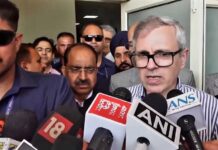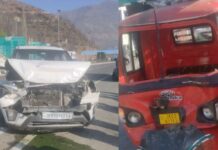Undated: The Baloch diaspora have staged demonstrations in various European countries to commemorate as a “Black Day” the 25th anniversary of Pakistani Nuclear tests in occupied-Balochistan and urged global organisations, like the UN and IAEA, to send teams to the region to assess the extent of damage caused by those explosions.
The participants in these demonstrations, organised by Baloch National Movement (BNM), highlighted that the radiation caused by those atomic explosions at Chaghai in Balochistan by Pakistan on May 28, 1998, was still affecting people and environment in that region.
The nuclear radiation exposed the people of Balochistan to several chronic diseases.
Many children were born with disabilities, and diseases such as cancer and skin disorders became more common in Balochistan, according to the protesters.
The protests and rallies were held in London, Gottingen (Germany), Amsterdam (The Netherlands) and some other places of Europe.
The common demand that resonated in all these rallies was that the international organisations like the UN, European Union and IAEA, should send teams to Chagai and adjoining areas of Balochistan to assess the damage that the radiation is still causing in that region.
They also warned that the world would not remain safe if Pakistan, which is unstable and financially-weak, continued to have Nuclear weapons.
There was a demand for disarming Pakistan with regard to the atomic weapons.
BNM says Pakistan deliberately chose Chagai in Balochistan for detonating 5 hazardous Nuclear devices to cause unending physical harm to the local population of the occupied-territory.
“Balochistan is a colony of Pakistan and such a heinous crime was committed to mortify our motherland’s soul and turn Balochistan into a burning hell,” says BNM.
Asghar Ali, the President of the BNM Germany, said the aftermath effect of these nuclear tests was staggering.
After these nuclear tests, the Chagai area experienced radical change. The drought became so frequent, he said.
“People in Chaghai are suffering from skin diseases and inborn disabilities. Livestock, the lifeline of Balochistan’s economy, has been affected immensely. Animals are dying in thousands,” Ali said, addressing the demonstrators in Gottingen.
He exhorted the International Atomic Energy Agency (IAEA), the global nuclear watchdog, and other organisations to send teams to conduct surveys in Balochistan to assess the effects of those Nuclear explosions.
Samul Baloch, the vice president of the Baloch National Movement Germany Chapter, said, “Balochistan, a region already grappling with numerous socio-political challenges, is now burdened with nuclear testing sites.
“The consequences of these tests are not limited to the immediate surroundings but extend beyond borders, impacting neighbouring countries and the overall ecosystem. The potential hazards to human health, the environment, and the delicate balance of nature cannot be ignored.”
Shar Hasan, the joint secretary of the BNM’s Germany Chapter, said, “Even today, the people of the world are oblivious to the ground reality of Balochistan. Pakistan has turned life into hell for the people of Balochistan by testing nuclear weapons in Balochistan.”
He added, “We call on the international community to take notice of the situation in Balochistan. International bodies, the United Nations and European Union, should keep a constant check on Pakistan. They should not support Pakistan financially or provide weapons to Pakistan.”
The people of Balochistan were in complete shock when Pakistan carried out its nasty nuclear bombs in Balochistan. The black mountain of Rasko turned white after the blasts.
Nadeem Saleem Baloch, the former Joint Secretary of BNM-Germany, highlighted the aftermath and said Pakistan carried out 5 nuclear blasts, 4 of which were 1 to 2 kilotons.
He appealed to IAEA and world powers to send an independent team to Balochistan and assess the gravity of the aftermath effects.
Member of the Baloch National Movement, Shali Daad Baloch, said, “From May 28, 1998 till today, people of Balochistan are confronting fatal diseases and many people are getting affected. Livestock and agriculture have been completely destroyed. People are suffering from various skin diseases.”
Before these nuclear tests, Shali said people had enough means of livelihood. “But the nuclear explosion deprived them of all means. It does not rain anymore in the area as it used to, and the areas have turned barren lands.”
She added, “Pakistan is a terrorist state, and lethal atomic bombs in its control are a looming threat to the world.
“The nuclear test in Chaghai turned the mountain of Raskoh into a heap of nuclear waste and caused deadly diseases, which have spread rampantly. We request that Pakistan’s nuclear weapons be banned and sanctioned because Pakistan committed war crimes in Balochistan by testing an atomic bomb in Chaghai.”
Ahmed Baloch, a member of the Baloch National Movement, addressed the participants, “Ever since Pakistan deceitfully captured Balochistan in 1948, it has been unsuccessfully trying to suppress the Baloch people in one way or another.
“The people of Balochistan, who have been systematically going backwards for the last seven decades, live in the stone age. Countries choose uninhabited zones and take adequate checks and balances to prevent harm to their citizens. Pakistan did the opposite.
“In a carefully calculated move, the Pakistani establishment zeroed in on the Raskoh Mountain range in Balochistan’s district Chaghai. Despite the passing of two decades since this catastrophic tragedy, the effects of radiation in Balochistan have yet to be studied.”
The Baloch National Movement would appreciate an external research team to go to Chaghai and conduct research on nuclear radiation.
Pakistan should be harshly penalised for a reckless atomic test in Balochistan, which brought unending hazards for the people of Balochistan.
Its dire consequences should be made public and strict measures should be taken to disarm Pakistan of nuclear weapons.
In Amsterdam, the protesters held placards and banners with slogans against Pakistan’s nuclear weapons and the devastating effects of the tests on the Baloch people and the environment.
The protesters also condemned the human rights violations by the Pakistani army in Balochistan.
Jamal Baloch, Media Coordinator of the Human Rights Department of BNM(Pank), addressed the protesters and said that Pakistan’s nuclear weapons threaten world peace and stability.
He urged the international community to raise its voice against Pakistan’s nuclear program and dismantle it to end the conflict and suffering in Balochistan and the region.
“Many children are born with deformities and disabilities, and thousands suffer from cancer,” he said.
In London, the Baloch National Movement UK organized a demonstration at Trafalgar Square which was attended by members and leaders of BNM, and also central leaders from the World Sindhi Congress, Lakho Lohana, and Hidayat Bhutto, and the Baloch Raji Zrumbesh (BRZ) leader Abdullah Baloch.








